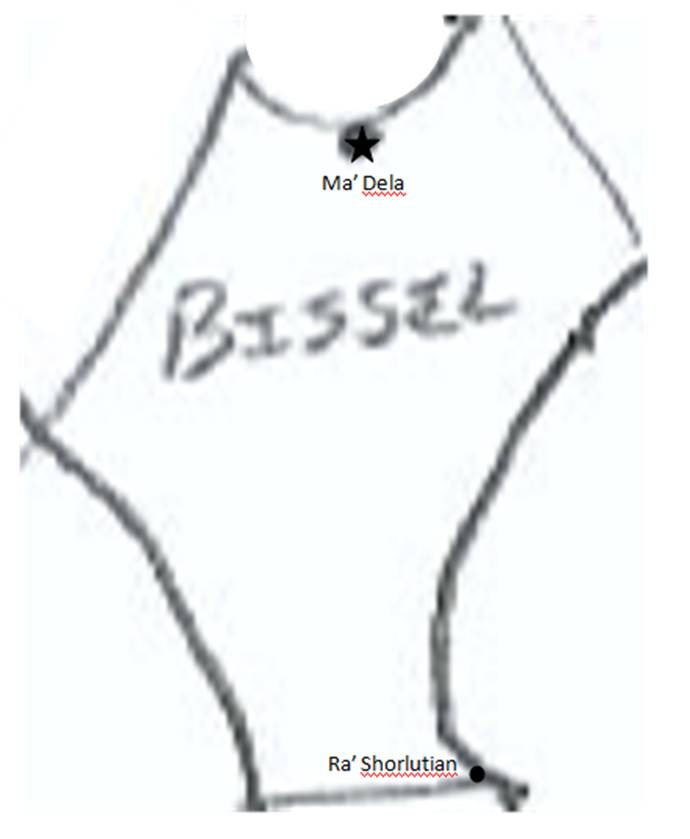Bissel (Existence Supplement)
| Existence's Contents |
|---|
| Information for Everyone |
| World Information |
| Information for the DM |
The Basics[edit]
Bissel is one of the newest nations, having just recently broken free from Urganto after hundreds of years of rebellions and revolutions. After a revolution lasting nearly fifty years, their freedom was won through incredible bloodshed and a hefty cost in resources. With their freedom, the nation became a first in politics, having a full democracy in which every village elects their village mayor, and these village mayors in turn elect the council and President of the nation. The capitol of Bissel is Ma’ Dela, a large city located on the southern tip of the Piked Mountains. Ra’ Shorlutian is the only other major city, located on the Inner Sea, near the Dead Pass.
The climate is temperate, allowing for the vast majority of the land to be used for agricultural purposes. This farmland, along with the mines in the Piked Mountains, allows for a nearly independent existence, where trade is only needed to bring in exotic luxuries. This independence has proven to be a great boon, as Urganto rarely trades anything of value, and the Elemental Isles haven’t traded for hundreds of years. With no major rivers, the land is mostly flat, with some hills along the northern end of the country.
Beliefs[edit]
The strict religious zeal of Urganto has left the people of the new nation of Bissel with skepticism, and so religion and belief are not very centralized. The Urganto gods are still very prevalent, because of the longstanding tradition of belief in them, but the President and Counsel do not recognize this worship. Instead, a belief in an evolution from this world is sponsored by the government, though without much zeal. This belief is simply that a person is born, lives, and dies so that they may learn all they can before being born again to learn more. When enough knowledge of this world is gained, they evolve into the celestial creatures of the Otherworld. This philosophy has no pantheon of gods, but instead uses all the gods of the known world equally to request aid.
Race & Gender[edit]
Equality is of the utmost importance in the nation of Bissel. Gender, race, and even age has no real meaning - instead, what matters is action. Thus, a young girl may become a Village Mayor if she does some great deed for the village, and has knowledge beyond what most her age would hope to know.
Slavery is strictly forbidden, and anyone found guilty of owning another is put to death immediately.
Current Affairs[edit]
The President is starting to more actively preach his faith, encouraging those who worship a single pantheon to drop their gods and focus on not only themselves, but those around them as well. Growing, learning as much possible, and passing on all the knowledge gained is encouraged, and public schools are being opened across the nation for all to attend.
With the Elemental invasion of Urganto, raids are being conducted more than ever before. These raids are bringing back some much-needed military equipment, exotic goods, and even lumber to help strengthen the fledgling Bissel army. Scouting parties are also being sent into the Waste Lands in an attempt to learn what is going on there, and why the undead seem to be more organized now than ever before.
Classes[edit]
Common Classes[edit]
• Alchemist: Found in the laboratory, an Alchemist is constantly brewing all kinds of potions, recording all they learn in hopes of finding “that” potion which will give their nation a much-needed edge in the inevitable war with Urganto to come.
• Monk: With weapons and armor often hard to come by, a monk trains hard by focusing on making their body and mind one - using weapons within themselves to protect their beliefs and aid their nation in times of need. These monks are the true religious figures of the Bissel faith, working to transcend this world in the next life.
• Rogue: The rogue is quite common amongst the people of Bissel, though these are not men and women stealing from the masses - rather they are the ones going out on raids against Urganto. Untrained in the proper forms of war, they instead rely on stealth and cunning to survive.
• Wizard: Bissel encourages learning in all forms, and Wizardry is one avenue to which many might turn to in order to grow and develop themselves. While many wizards are hermits that will raid any local library they come across, small schools have been founded across the nation to train the youngest hopefuls in the basics of wizardry.
Rare Classes[edit]
• Cleric: Faith is not that important in the daily lives of Bisselians. Because of this, few churches are founded, and though a church to any deity may be established, with few followers to help pay the bills, these churches seldom last long and leave their clerics to wander the world.
• Inquisitor: After such a harsh time under Urganto rule, even the most faithful have little desire for the bloodshed that flows in an Inquisitor’s wake of divinely-inspired zealousness. Forced indoctrination is strictly prohibited, and the few inquisitors act in opposition to the common laws.
• Paladin: The paladin, a warrior of the faith, is quite rare amongst the Bisselians due to both aspects of the paladin being uncommon. Organized faith is rare, and training and equipment for warriors is uncommon to say the least. It is nearly unheard-of for a young person to have access to both, and very few answer the call of the Paladin - though a few devoted warriors of the faiths remain.
Back to Main Page → 3.5e Homebrew → Campaign Settings → Existence Campaign Setting
